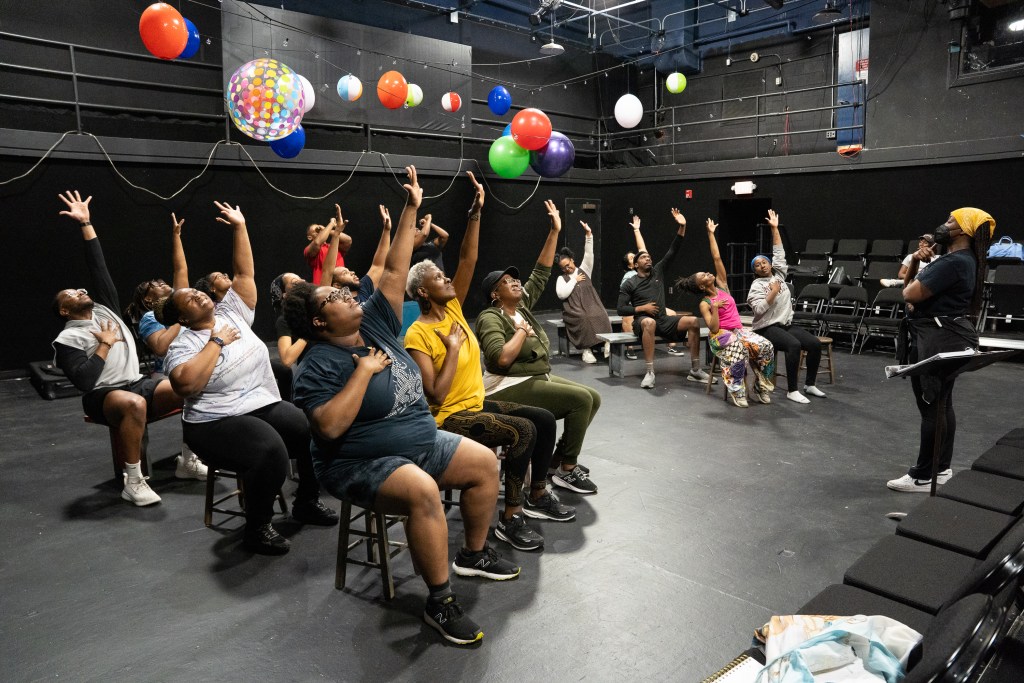Even before the COVID pandemic, North Carolina Theatre was struggling to survive.
In 2019, the year before nationwide shutdowns emptied theaters, Raleigh’s oldest professional theater company was already in the red, ending the year with a loss of about $670,000. Debts were piling up and starting to overtake North Carolina Theatre’s (NCT) assets. And philanthropic funding, including grants, company sponsorships, and individual donations, had nearly halved, dropping from about $2 million in 2016 to $1.1 million in 2019.
Then, the pandemic.
Like all theaters, NCT was hit hard. The arts organization, which could not be reached for comment, was forced to cancel all but one show in 2020, and ticket revenue plummeted. NCT got a brief reprieve in 2021 with an influx of more than $500,000 in emergency federal funding, but it was all too temporary. Even after lockdowns were lifted, NCT struggled to fill the 2,300 seats of Raleigh Memorial Auditorium, a venue it had once rescued from obscurity.
In 1984, the year NCT was founded, it brought in thousands of patrons clamoring to see Broadway musicals—a major factor in the transformation of Raleigh Memorial Auditorium from a little-used, minimally functional stage into Martin Marietta Center for the Performing Arts, now a major performing arts center. But by 2023, falling ticket sales had forced NCT to retreat into a smaller, 600-seat stage within the Martin Marietta Center for the Performing Arts.
And in the same way audiences were slow to return, sponsoring companies were slow to resume spending after the pandemic, adding yet another layer to NCT’s financial crisis.
“Corporate sponsorship is nonexistent, pretty much,” Michele Weathers, longtime arts manager and executive producer at Raleigh Little Theatre, told the INDY in early April. “Folks that we had counted on in years past, both at the [Carolina] Ballet and also at Raleigh Little Theatre, are not sponsoring at the same level or sponsoring at all.”
By early 2024, the situation was so desperate that NCT was forced to file for bankruptcy. Despite attempts to reorganize, secure millions in state funding, and put on more cost-effective productions, NCT couldn’t front enough cash to produce its next show, Rent.
Its last show before suspending the 2024 season was Elf, in January. It would turn out to be the last show ever put on by the theater, one of the main driving forces behind the growth of Raleigh’s local arts scene.
Steering an ocean liner
Despite its name, North Carolina Theatre is a regional company, albeit one with an ambitious mission that has extended beyond its hometown city.
Although it didn’t benefit from steady state funding, NCT has traditionally hired professional actors out of New York to put on national-scale Broadway musicals. Where Raleigh Little Theatre runs on volunteers, and Burning Coal puts on small, entirely local productions, NCT brought Times Square–level spectacle to the Triangle on its own dime.
“They punched above their weight,” says Nate McGaha, executive director of Arts NC, an advocacy and lobbying organization. “I’ve been to DPAC [the Durham Performing Arts Center] to see the Broadway touring shows, and the shows NCT puts on are of a similar quality.”
As an equity theater, NCT paid actors union wages, significantly more money than the non-union wages other local theaters pay actors, as well as providing benefits like health care, retirement, and pension.
“They [the actors] had to be traveled, they had to be housed, they had to be given local transportation,” says Weathers, who worked as a producer for NCT from 1991 to 2005. “All of that was required by the union.”
In addition to hiring actors and backstage crew, sets and costumes had to be rented and often trucked across the country, Weathers adds. Like the Goodman Theatre in Chicago, or Theatre Under the Stars in Houston, NCT had a business model that “will never pay for itself,” Weathers says. “It always will be dependent on contributed income, and that public and private support to make it successful.”
As the Triangle’s theater landscape grew and NCT faced more competition for audiences, its business model became less sustainable, Weathers argues. The size of NCT and the scale of its productions were as detrimental in 2024 as they were beneficial in 1984, when it was one of the only arts organizations in the Triangle.
The opening of DPAC in 2008 “was a huge kick in the gut for North Carolina Theatre, and one that was really hard to recover from,” Weathers says. “I don’t think they ever did.”
The Great Recession and, 12 years later, the COVID pandemic, didn’t help maintain NCT’s thin profit margins. And whether it was due to shifting leadership or simply the overwhelming difficulty of getting back in the black, NCT never pivoted to a more profitable system.
Where smaller arts organizations like Raleigh Little Theatre are “pretty easy and nimble to turn,” Weathers says, “North Carolina Theatre is a little bit like the Queen Mary. It’s gonna take a lot longer to turn and make changes.”

Closing the curtain
The North Carolina Theatre has already halted its main stage performances, but it will close for good in May, after a four-show run of Into the Woods by NCT’s Conservatory. As NCT moves out of its rented space at the Kennedy Space Center, off Old Wake Forest Road, Theatre Raleigh will be moving in.
Unlike NCT, Theatre Raleigh typically produces smaller musicals and niche Broadway or off-Broadway shows. The theater’s main stage season is always engaging, and often surprisingly delightful, but does not usually include attention-grabbing titles like Rent or Dreamgirls.
Executive director Lauren Kennedy Brady declined to comment on Theatre Raleigh’s plans for the space, which is in the same building as the theater’s studio and across the street from its main stage. But it may be a boost to Theatre Raleigh’s educational programs, as an additional space for rehearsals and classes. Theatre Raleigh’s takeover could also open up opportunities for smaller arts organizations around the Triangle if it opens up the space for rental.
As many problems as NCT faced, the president and CEO of United Arts Wake County, Jenn McEwen, doesn’t chalk up its closure to a failure of leadership.

“A lot of it was very unlucky,” McEwen says. “NCT had a very active board of directors, and they were out there pounding the pavement, opening their own wallets.”
And although the Triangle now has an abundance of theaters, there’s no doubt that NCT, once the beating heart of Raleigh’s arts scene, will be seriously missed.
Aside from the economic impact, because people who once attended NCT shows will likely now travel to Durham, the cost of seeing a Broadway musical in the Triangle will be higher. With only steeper DPAC tickets available, low- or middle-income Raleighites might miss out on a transformative arts experience.
In addition, the closure of NCT’s conservatory means less arts education for Raleigh residents, says McEwen. Local actors will also miss out on a chance to gain experience, says Weathers.
“The sad thing about losing North Carolina Theatre is the opportunity for our young people to potentially share the stage with professional artists, who would then expand their view of what the world is like,” says Weathers.
“[For them] to get to interact with people who are different from them, that have a different life?” Weathers continues. “For me, that’s the biggest loss.”
To comment on this story, email [email protected].
